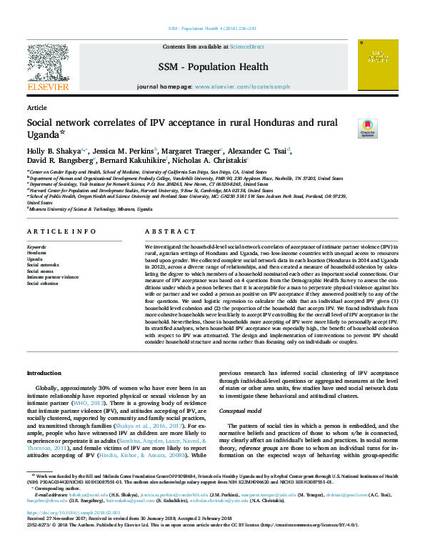
- Family violence -- Uganda,
- Family violence -- Honduras,
- Family violence -- Prevention,
- Victims of family violence
We investigated the household-level social network correlates of acceptance of intimate partner violence (IPV) in rural, agrarian settings of Honduras and Uganda, two low-income countries with unequal access to resources based upon gender. We collected complete social network data in each location (Honduras in 2014 and Uganda in 2012), across a diverse range of relationships, and then created a measure of household cohesion by calculating the degree to which members of a household nominated each other as important social connections. Our measure of IPV acceptance was based on 4 questions from the Demographic Health Survey to assess the conditions under which a person believes that it is acceptable for a man to perpetrate physical violence against his wife or partner and we coded a person as positive on IPV acceptance if they answered positively to any of the four questions. We used logistic regression to calculate the odds that an individual accepted IPV given (1) household level cohesion and (2) the proportion of the household that accepts IPV. We found individuals from more cohesive households were less likely to accept IPV controlling for the overall level of IPV acceptance in the household. Nevertheless, those in households more accepting of IPV were more likely to personally accept IPV. In stratified analyses, when household IPV acceptance was especially high, the benefit of household cohesion with respect to IPV was attenuated. The design and implementation of interventions to prevent IPV should consider household structure and norms rather than focusing only on individuals or couples.

© 2018 The Authors. Published by Elsevier Ltd. This is an open access article under the CC BY license (http://creativecommons.org/licenses/BY/4.0/).